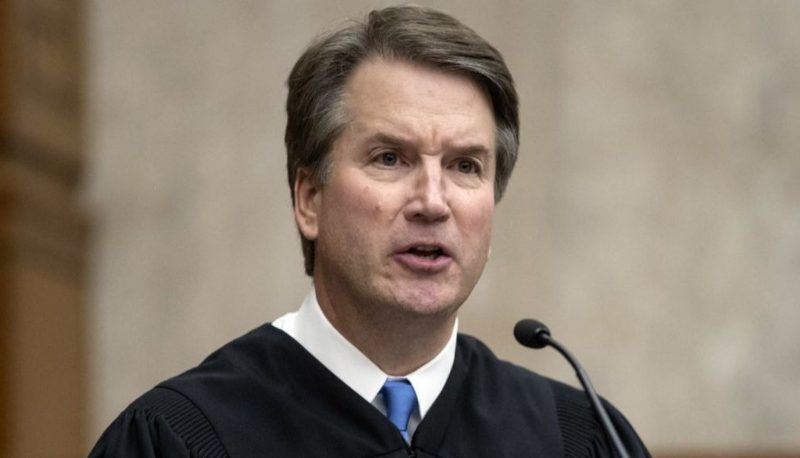On September 28, as developments continued to unfold regarding the sexual assault allegations made against Brett Kavanaugh, People For the American Way joined allied organizations in voicing strong opposition to Trump’s Supreme Court nominee based on his record of siding with corporations to the detriment of consumers, workers, everyday Americans and the public interest. If confirmed, Kavanaugh would weaken independent government agencies and leave us vulnerable to predatory practices, financial instability and Wall Street wrongdoing. You can download our letter here.
Dear Senators,
The 23 undersigned consumer, community, civil rights and labor organizations strongly urge you to oppose the nomination of Brett Kavanaugh to serve as an Associate Justice of the Supreme Court.
Judge Kavanaugh consistently sides with corporations to the detriment of consumers, workers, ordinary Americans and the public interest. His pro-corporate jurisprudence is often far afield from that of his colleagues on the D.C. Circuit. He notably has the most dissents per year of service on the bench. His views are so extreme that in some instances his conservative colleagues have declined to adopt them.
As organizations focused on consumer financial protection and on the need to properly regulate the financial sector to prevent grave harms to individuals, families, communities, and economic stability, we are deeply concerned about his hostility to consumer protection and to independent agencies. Although the constitutionality of independent federal agencies has long been upheld by the Supreme Court, in 2016, Judge Kavanaugh found that the Consumer Financial Protection Bureau (CFPB) was unconstitutional because its director is removable by the president only for cause, and not simply because the president desires to remove them. The Supreme Court has long recognized that an independent structure is of tremendous importance in allowing regulators to carry out the law and protect the public without undue influence from political or industry pressures. This independence, for example, has helped the CFPB to be successful in carrying out its consumer protection mandate, which includes returning nearly $12 billion to harmed consumers.
But Judge Kavanaugh showed no respect for this Supreme Court precedent, or for congressional will—supported by Supreme Court precedent—in establishing an effective and independent agency for consumer protection. His decision in this case was ultimately overruled by a majority of the D.C. Circuit sitting en banc in a strongly worded opinion, but if he is confirmed as a Supreme Court justice, it could prevail. Both his original decision and his dissent display a radical choice that would leave Americans much more vulnerable to harm by corporate wrongdoers.
This case was not the first time Judge Kavanaugh expressed his disdain towards independent agencies, and only one of many times that he sided with powerful corporate interests against key public protections. In an earlier case regarding the constitutionality of the removal provisions for the Public Company Accounting Oversight Board, he criticized the long standing Supreme Court precedent upholding them, and it is not at all clear that as Supreme Court justice he would uphold the constitutionality of any independent agency.
Judge Kavanaugh’s pro-corporate jurisprudence is particularly evident in his view on standing, which tilts the litigation playing field heavily in favor of corporations and hinders the public’s ability to access the court system. In Judge Kavanaugh’s rulings, he makes clear that he believes regulated businesses almost always have standing to challenge agency rules and action. By contrast, consumer, civil rights and other public interest organizations face enormous hurdles to establish standing under Judge Kavanaugh’s jurisprudence. In cases in which Judge Kavanaugh issued a written opinion and judges hearing the case were divided on issues of standing, ripeness or justiciability, Judge Kavanaugh always decided for corporations (six out of six times) and always decided against citizen groups (three out of three times).
Furthermore, Judge Kavanaugh demonstrates his anti-regulatory stance with the version of the “major questions” doctrine he has evoked. The major questions doctrine cuts unilaterally against regulation on important topics. Under this theory, agencies are forbidden to regulate on major economic and social matters—an undefined category to be determined by judges—unless they are specifically instructed to do by Congress. In practice, this doctrine would amount to a severe shackling of agencies’ regulatory authority over the most consequential matters under their jurisdiction. Adoption of the “major questions” doctrine would go far beyond limiting Chevron deference, the well-established Supreme Court precedent that gives deference to agency decisions when the statute is ambiguous. Chevron deference has played a crucial role in upholding the ability of federal agencies to enact and enforce regulatory protections to safeguard the American people. But instead of deferring to agencies, Judge Kavanaugh’s invocation of the major questions doctrine could cripple their ability to adequately protect Americans from harm.
Judge Kavanaugh’s confirmation to the Supreme Court would give him ample opportunity to weaken all independent agencies working within their congressional mandate to protect the public, and thereby leave us all much more vulnerable to predatory practices, to actions that put the stability of the entire financial system at risk, and to Wall Street wrongdoing.
We urge you to oppose his nomination.
